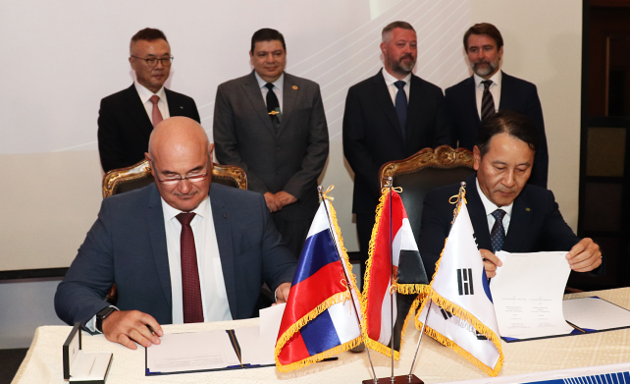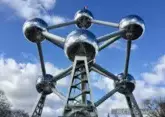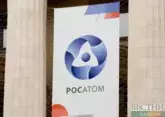The engineering division of the state corporation Rosatom - Atomstroyexport - and the Korea Hydro and Nuclear Power Corporation signed a contract for the construction of "turbine islands" for the Dabaa nuclear power plant project in Egypt. The South Korean company will build 80 buildings and structures at four power units of the station, as well as purchase and supply equipment and components for the turbine islands of nuclear power plants. The contract was preceded by long-term negotiations. Back in December last year, Rosatom approved the Korea Hydro and Nuclear Power Corporation as the preferred bidder that was allowed to discuss and sign a contract.
"The Turbine Islands deal can be seen as a significant achievement in Korea, confirming our ability to build and manage projects that have been demonstrated in the UAE. Based on our experience gained in the UAE, Korea Hydro and Nuclear Power will make every effort to ensure the success of the Dabaa project,” President Hwang Ki-ho.
"In July, the project entered the full-scale construction phase. The Dabaa NPP construction project is attractive to international companies. KHNP joins the pool of qualified project participants, including large Egyptian companies selected to be involved in construction work on the site," Atomstroyexport Senior Vice President for NPP Construction Project Management Alexander Korchagin said. “Thanks to the well-coordinated joint work of the Russian, Egyptian and Korean teams, we will achieve success in the implementation of this grandiose project.”
"Nuclear generation not only plays an important role in meeting the growing demand for electricity and achieving carbon neutrality around the world but also unites countries. Cooperation in the field of nuclear technologies should not be interrupted in the face of turbulence, but rather we must strengthen and expand it in the interests of our countries," Deputy Director of Rosatom Global Business Development Boris Arseev said.
According to The Washington Post, the South Koreans hailed the 3 trillion won deal as a triumph for their nuclear power industry, although it made for awkward optics as their American allies push an economic pressure campaign to isolate Russia over its special operation in Ukraine. South Korean officials said the United States was consulted in advance about the deal and that the technologies being supplied by Seoul for the project would not clash with international sanctions against Russia. Atomstroyexport, also called ASE, is a subsidiary of Rosatom, a state-owned Russian nuclear conglomerate. The company has a contract with Egypt to deliver four 1,200 megawatt reactors through 2030. Korea Hydro and Nuclear Power’s part of project is from 2023 to 2029.
A senior aide of South Korean President Yoon Suk Yeol said the negotiations were slowed by “unexpected variables,” mainly the U.S.-led sanctions campaign against Moscow.
Choi Sang-mok, Yoon’s senior secretary for economic affairs, said South Korea provided an explanation to the United States in advance about its plans to participate in the Dabaa project and that the allies will maintain close consultation as the work proceeds. As part of U.S.-led sanctions against Moscow, South Korea has ended transactions with Russia’s central bank and sovereign wealth funds and banned exports of strategic materials to Russia. Neither Choi nor officials from South Korea’s trade ministry elaborated on how the crisis in Ukraine and the sanctions on Moscow affected the negotiations between Korea Hydro and Nuclear Power and ASE. Choi stressed that South Korea’s involvement in the project would not clash with international sanctions against Russia. “Any kind of issue can be met by various uncertainties, but those have all been resolved as of now, and that’s why we were able to finalize the agreement,” he said.
Yoon’s office expressed hope that South Korea’s participation in the Dabaa project would help the country gain a foothold in future nuclear projects across Africa and also improve its chances to export to countries such as the Czech Republic, Poland and Saudi Arabia.
Korea Hydro and Nuclear Power had been engaging in negotiations with ASE as the preferred bidder for the turbine-related project since December before the special operation started in Ukraine in late February.
Go Myong-hyun, a senior analyst at Seoul’s Asan Institute for Policy Studies, said the deal wouldn’t have been possible without an export approval by the United States as the components provided by Korea Hydro and Nuclear Power likely include U.S.-originated technology.
Current sanctions against Moscow also do not include specific restrictions related to nuclear energy and the Biden administration would have no interest in disrupting a crucial project for Egypt, which it sees as a key partner in the region, Go said. While South Korea’s involvement in the Dabaa project wouldn’t immediately be a problem between the allies if the Americans signed off on it, things could change depending on the developments in Ukraine and whether Washington expands its export controls against Moscow, Go said.
Yoon’s office said the Dabaa project is South Korea’s biggest export of nuclear power technology since 2009, when a South Korean-led consortium won a $20 billion contract to build nuclear power reactors in the United Arab Emirates.
Yoon, a conservative who took office in May, has pledged to boost South Korean exports of nuclear power technology, which he says were dented under the policies of his liberal predecessor, Moon Jae-in, who sought to reduce the country’s domestic dependence on nuclear energy. Yoon in a social network statement said the deal reaffirms South Korea’s “advanced technology and safeness and strong supply chains” in the nuclear power industry. His government has set a goal of exporting 10 nuclear power reactors by 2030.










